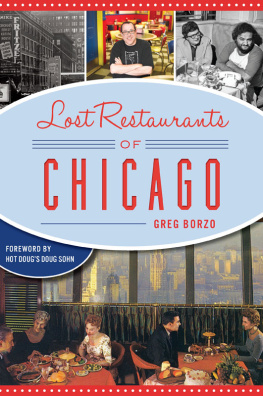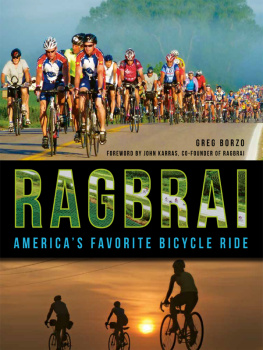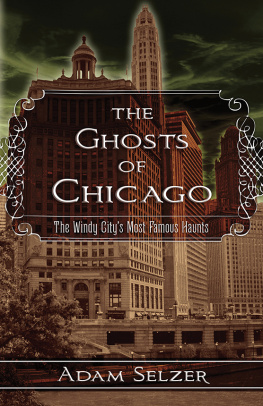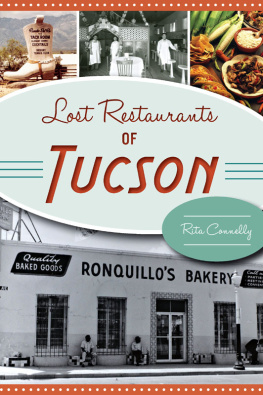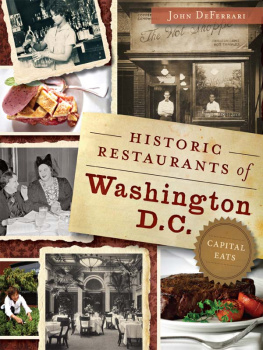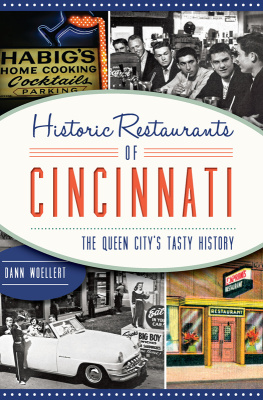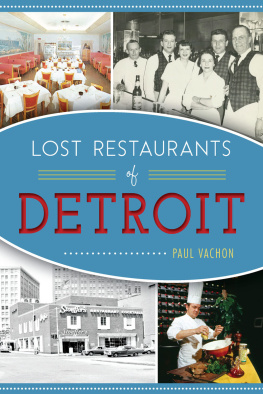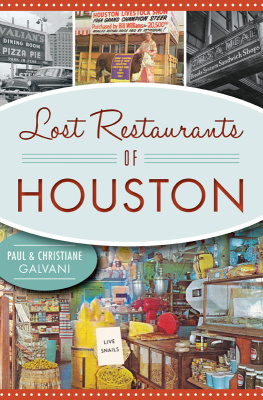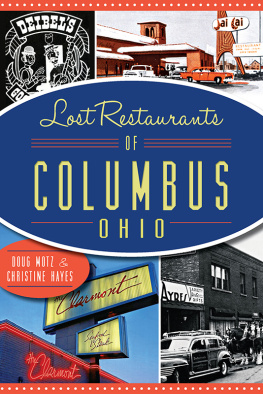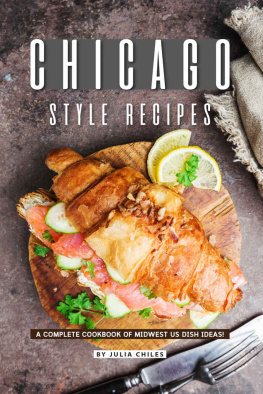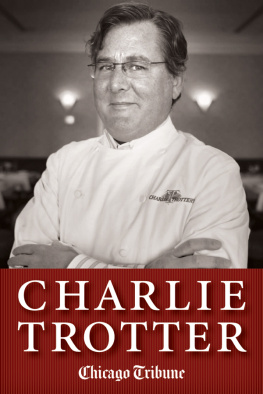
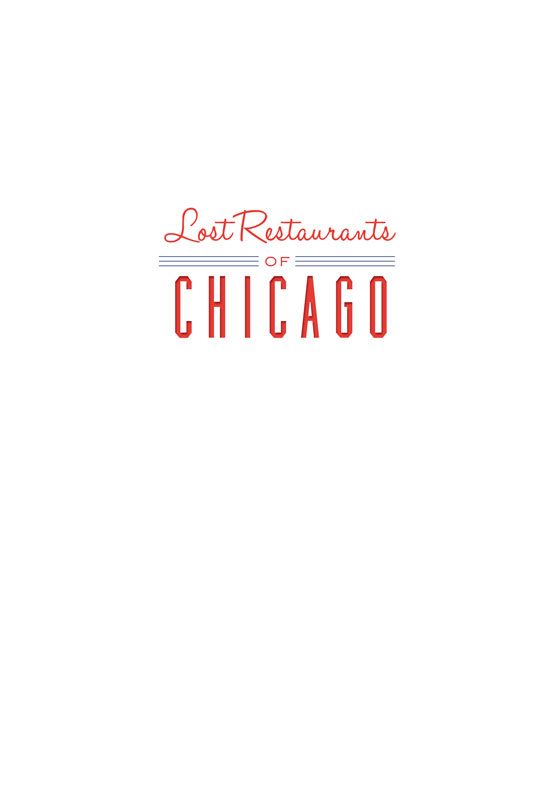

Published by American Palate
A Division of The History Press
Charleston, SC
www.historypress.com
Copyright 2018 by Greg Borzo
All rights reserved
Front cover, top middle: Doug Sohn.
First published 2018
e-book edition 2018
ISBN 978.1.43966.592.3
Library of Congress Control Number: 2018952865
print edition ISBN 978.1.62585.933.4
Notice: The information in this book is true and complete to the best of our knowledge. It is offered without guarantee on the part of the author or The History Press. The author and The History Press disclaim all liability in connection with the use of this book.
All rights reserved. No part of this book may be reproduced or transmitted in any form whatsoever without prior written permission from the publisher except in the case of brief quotations embodied in critical articles and reviews.
To my nieces and nephews: Paula, Theresa, Cecilia, Peter Chris, Nicole, Colin, Peter Benjamin, Sarah, Oliver and Alex. You guys are great! May you stand together forever.
Contents
Foreword
When reminiscing about their city and the restaurants they miss, Chicagoans will talk forlornly about such revered icons as The Bakery, Jacques, Don Roths Blackhawk (I still often quote the tagline tossed three times so as not to bruise the tender leaves whenever Im making a salad), Le Perroquet and other beacons of fine dining.
Not me. When Im asked about which restaurant I miss, I only have one answer: the stand-up hot dog counter at the Woolworths on the Magnificent Mile.
Located on the 600 block of North Michigan Avenue, the five-and-dime store Woolworths was my Target. Its where I bought my school supplies and Tootsie Rolls, where I looked confusingly at the canaries and turtles for sale in the back of the store, where I bought my Cubs hat in 1977 (and wore it until I retired it in 2016 because, well, you know why) and, most importantly, where I stood at the counter in the window facing the street eating hot dogs (mustard only, please) and a bag of Jays potato chips and drank an icy Coca-Cola through a striped paper straw. Nirvana.
I stood next to bus drivers and cops, moms with toddlerswhich was once my mom and meprofessionals in suits and ties, shoppers and pretty much anyone who lived in Chicago back then. It was quick, easy and delicious. Woolworths had a sit-down restaurant with stools, a wavy counter and a server who brought your food to you. But that was too fancy. I preferred the stand-up place with the hot dogs heating as they rolled back and forth on the metal contraption that was designed solely to cook wieners.
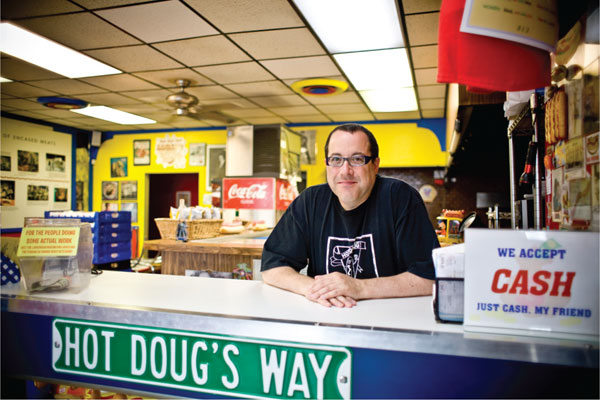
Doug Sohn, founder of Hot Dougs, Chicagos Sausage Superstore, made an art of crafting, selling and celebrating encased meats. Doug Sohn.
We all miss our favorite restaurants. We miss the familiarity. We miss knowing exactly how our favorite dish is going to taste. We miss seeing the same staff each time we go in. We would look at the menu knowing full well what was on it and knowing full well what we were going to order. We miss seeing ourselves when we were younger.
Before my family moved downtown when I was around twelve years old, we lived in Deerfield. Back in the 60s, that was pretty much like living in the country. And the food scene may have been worse. There were the Italian restaurants in Highwood, like My Favorite Inn, that wed go to a few times each year and where Id order plain spaghetti with butter. But for the most part, the suburbs truly constituted a food desert.
Back then, the dining highlight for me was every Sunday night when we would get dinner from Don the Cantonese Chef. It was take-out only with a small opening where they would hand you your order in a brown grocery bag, and there were a couple of plastic chairs where you could sit and wait. It also had this totally coolat least thats what I thoughtCoke machine where the glass bottles laid on their sides. You put your coin in the slot (Im guessing it was a dime), opened the glass door and pulled the bottle straight out. You had to drink it there and place your empty bottle in the crate next to the machine. The egg foo yung was pretty good too, as I recall. Most importantly, Id take the little bag of crunchy chow mein noodles with me to snack on while watching L.A. T-Birds roller derby and Bob Luce professional wrestling on TV.
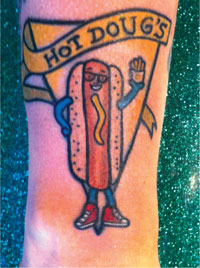
Hot Dougs fans were so enthralled with the restaurant that many of them had the restaurants logo tattooed on their arms, legs...and unmentionable places. Doug Sohn.
And then we moved to the big city. Chicago back then was most definitely not the dining destination it is today. Back then, fine dining often meant you would get pineapple slices on your steak, and a wedge salad was called a salad. Or there were fancy French restaurants like the aforementioned Jacques and Le Perroquet. We never went to those; they must have been thought of as too exotic. We did go to Kon Tiki Ports, and there was a Mandarin restaurant whose name I cant remember. I guess that was about as exotic as we could handle.
Im happy to say that those days are long over. I can now brag that I live in one of the great restaurant cities in the world. And yet, there are lots of restaurants that are no longer with us and that I miss dearly: Charmets; the Belden Deli; Lances; Burts (which is now the Wieners Circle but was a lot less crowded and a lot more peaceful back then); Moto, where I first experienced how funny and clever food could be; the Drake Hotel drugstore; and the amazing Star Top Caf on North Lincoln Avenue that was the first restaurant to genuinely challenge me and open up the possibilities of what a restaurant could be.
Oh yeah, I kinda miss Hot Dougs, too. Theres a rumor going around that its mentioned somewhere later on in this book. Im genuinely flattered to be a part of such wonderful company.
I could really go for a Woolworths hot dog right about now.
Doug Sohn
Founder of Hot Dougs, the Sausage Superstore and
Encased Meat Emporium (200114)
Acknowledgements
Chicago has so many bygone restaurants that starting this project was intimidating. Which ones to include? Who to interview? What to read? A wealth of people helped me pull this book together, and Im deeply grateful to all of them for their assistance. Many restaurateurs, historians, food critics, authors, bloggers and other experts shared stories, knowledge and experiences. Chief among them was Eric Bronsky, an author, Chicago restaurant historian and collector of restaurant paraphernalia. Eric provided invaluable insights, innumerable suggestions, impressive editing skills and photographs, all of which greatly enhanced this book. Long may you continue to enjoy your passion for Chicago restaurants, in terms of their histories as well as their food.
A few restaurateurs really stood out. Early in the project, Gordon Sinclair was quick to respond to my questions and generous with his time. Later on, Marc Schulman was especially enthusiastic about the book and willing to provide everything that was asked of him. Jeff Thomas was helpful. But most of all, Doug Sohn was extremely responsive and supportive. He was so interesting and easy to speak with that I asked him to write the foreword to this book. I was glad he said yes, impressed when he beat the deadline and delighted with his contribution.
Next page
